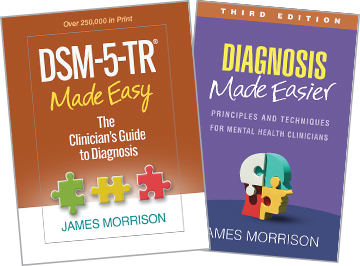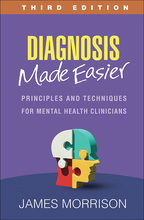Diagnosis Made Easier
Third Edition
Principles and Techniques for Mental Health Clinicians
James Morrison
HardcoverPaperbacke-bookprint + e-book
Hardcover
orderJanuary 15, 2024
ISBN 9781462553419
Price: $68.00 348 Pages
Size: 6" x 9"
Paperback
orderJanuary 4, 2024
ISBN 9781462553402
Price: $45.00 348 Pages
Size: 6" x 9"
e-book
orderDecember 22, 2023
PDF and Accessible ePub ?
Price: $45.00 348 Pages
ePub is Global Certified Accessible
print + e-book $90.00 $54.00
orderPaperback + e-Book (PDF and Accessible ePub) ?
Price: 348 Pages
ePub is Global Certified Accessible
Check out a special package offer including this title!

Read a Q&A with featured author, James Morrison!
Sign up for emails on upcoming titles by James Morrison (with special discounts)!
Sign up for emails on upcoming titles by James Morrison (with special discounts)!
“A useful resource for clinicians to learn a systematic approach for arriving at diagnoses....Appropriate for students and those in early postgraduate training, as well as more experienced clinicians endeavoring to teach this material.”

—Psychiatric Services (on the first edition)
“This book pulled me in, because it is different than most other books on diagnosis, it fills a niche, and the writing style is marvelous....Morrison adopts the role of a friendly tutor, one who has a wealth of clinical experience but assumes that some readers are new to this and that some seasoned clinicians were trained poorly or have developed bad habits that interfere with their capacity to reliably diagnose patients with precision. He writes in a style that is both scientific and professional, but also conversational....This book would be of value to students in training, as the basis for a course on diagnostics, or as a reference honing the skills of experienced clinicians, which is exactly how I used it. This is an exceptional book that must be read and reread because of the wealth of information it contains.”

—PsycCRITIQUES (on the first edition)
“Morrison lays out the principles of the diagnostic process and their application to common clinical challenges, such as concurrent psychiatric and general medical comorbidities. Extraordinarily useful chapters engage the reader in the application of diagnostic principles and building blocks to a wide range of discerningly presented clinical cases. Now more than ever, as health care systems inappropriately substitute symptom checklists for actual diagnoses, the risk of errors is substantial. Mental health professionals must understand and apply diagnostic processes to recognize when a revised diagnosis or second opinion is called for. This is the best book I have ever seen that addresses this critical need. Please buy and use this third edition—we owe it to ourselves and our patients to get it right.”

—A. John Rush, MD, ABPN, Duke Medical School; National University of Singapore (Emeritus)
“The third edition of Diagnosis Made Easier retains everything that has made this book such a trusted resource, while incorporating comprehensive updates for DSM-5-TR. This book discusses core principles of diagnosis as well as how to apply these principles across a wide range of problems. Morrison combines clear writing, cutting-edge content, and abundant illustrative examples drawn from clinical practice and popular culture.”

—Martin M. Antony, PhD, ABPP, Department of Psychology, Toronto Metropolitan University, Canada
“An intuitive and indispensable resource. With clarity and precision, Morrison uses vignettes and practical examples to elucidate the complexities of psychiatric diagnosis. Beyond the technical aspects of diagnosis, the book emphasizes the significance of compassionate care, effective communication, and collaborative decision making. Leveraging his wealth of clinical expertise and meticulous approach to diagnosis, Morrison establishes this third edition as an essential guide for health care professionals.”

—David H. Klemanski, PsyD, MPH, Department of Psychiatry, Yale University
“This book presents the art of diagnosis in a logical framework, and has been updated for DSM-5-TR. Morrison presents multiple case examples and uses flow charts to lead clinicians to the appropriate diagnosis or diagnoses, so they can formulate effective treatment plans. I particularly enjoyed the scholarly and historical tidbits that are liberally sprinkled throughout the chapters. I recommend this wonderful, clearly written guide to trainees in mental health fields, as well as established practitioners.”

—David L. Dunner, MD, FACPsych, Director, Center for Anxiety and Depression, Mercer Island, Washington
—Psychiatric Services (on the first edition)
“This book pulled me in, because it is different than most other books on diagnosis, it fills a niche, and the writing style is marvelous....Morrison adopts the role of a friendly tutor, one who has a wealth of clinical experience but assumes that some readers are new to this and that some seasoned clinicians were trained poorly or have developed bad habits that interfere with their capacity to reliably diagnose patients with precision. He writes in a style that is both scientific and professional, but also conversational....This book would be of value to students in training, as the basis for a course on diagnostics, or as a reference honing the skills of experienced clinicians, which is exactly how I used it. This is an exceptional book that must be read and reread because of the wealth of information it contains.”
—PsycCRITIQUES (on the first edition)
“Morrison lays out the principles of the diagnostic process and their application to common clinical challenges, such as concurrent psychiatric and general medical comorbidities. Extraordinarily useful chapters engage the reader in the application of diagnostic principles and building blocks to a wide range of discerningly presented clinical cases. Now more than ever, as health care systems inappropriately substitute symptom checklists for actual diagnoses, the risk of errors is substantial. Mental health professionals must understand and apply diagnostic processes to recognize when a revised diagnosis or second opinion is called for. This is the best book I have ever seen that addresses this critical need. Please buy and use this third edition—we owe it to ourselves and our patients to get it right.”
—A. John Rush, MD, ABPN, Duke Medical School; National University of Singapore (Emeritus)
“The third edition of Diagnosis Made Easier retains everything that has made this book such a trusted resource, while incorporating comprehensive updates for DSM-5-TR. This book discusses core principles of diagnosis as well as how to apply these principles across a wide range of problems. Morrison combines clear writing, cutting-edge content, and abundant illustrative examples drawn from clinical practice and popular culture.”
—Martin M. Antony, PhD, ABPP, Department of Psychology, Toronto Metropolitan University, Canada
“An intuitive and indispensable resource. With clarity and precision, Morrison uses vignettes and practical examples to elucidate the complexities of psychiatric diagnosis. Beyond the technical aspects of diagnosis, the book emphasizes the significance of compassionate care, effective communication, and collaborative decision making. Leveraging his wealth of clinical expertise and meticulous approach to diagnosis, Morrison establishes this third edition as an essential guide for health care professionals.”
—David H. Klemanski, PsyD, MPH, Department of Psychiatry, Yale University
“This book presents the art of diagnosis in a logical framework, and has been updated for DSM-5-TR. Morrison presents multiple case examples and uses flow charts to lead clinicians to the appropriate diagnosis or diagnoses, so they can formulate effective treatment plans. I particularly enjoyed the scholarly and historical tidbits that are liberally sprinkled throughout the chapters. I recommend this wonderful, clearly written guide to trainees in mental health fields, as well as established practitioners.”
—David L. Dunner, MD, FACPsych, Director, Center for Anxiety and Depression, Mercer Island, Washington



